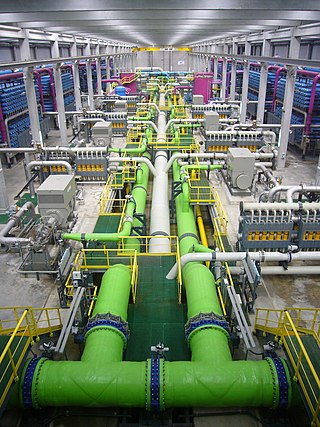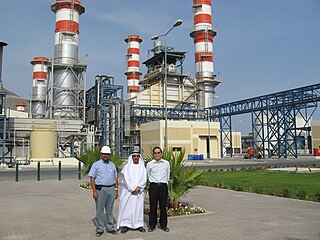
The United Arab Emirates is situated in the Middle East and West Asia, bordering the Gulf of Oman and the Persian Gulf, between Oman and Saudi Arabia; it is at a strategic location along the northern approaches to the Strait of Hormuz, a vital transit point for world crude oil. The UAE lies between 22°50′ and 26° north latitude and between 51° and 56°25′ east longitude. It shares a 19 km (12 mi) border with Qatar on the northwest, a 530 km (330 mi) border with Saudi Arabia on the west, south, and southeast, and a 450 km (280 mi) border with Oman on the southeast and northeast.

Desalination is a process that takes away mineral components from saline water. More generally, desalination refers to the removal of salts and minerals from a target substance, as in soil desalination, which is an issue for agriculture. Saltwater is desalinated to produce water suitable for human consumption or irrigation. The by-product of the desalination process is brine. Desalination is used on many seagoing ships and submarines. Most of the modern interest in desalination is focused on cost-effective provision of fresh water for human use. Along with recycled wastewater, it is one of the few rainfall-independent water resources.

Masdar (Arabic:مصدر), also known as the Abu Dhabi Future Energy Company, is a UAE-government owned renewable energy company based in Abu Dhabi, United Arab Emirates. It was founded in 2006 as a subsidiary of the UAE state-owned Mubadala Investment Company, and has developed and invested in renewable energy projects in 40 countries.

The Abu Dhabi National Oil Company or ADNOC is the state-owned oil company of the United Arab Emirates (UAE).

Dolphin Energy is a gas company of Abu Dhabi, United Arab Emirates. It was established in March 1999 by the Government of Abu Dhabi. As of today, Dolphin Energy is owned by Mubadala Investment Company, on behalf of the Government of Abu Dhabi,, Total S.A. (24.5%) and Occidental Petroleum (24.5%). It also has operations based in Doha, Qatar.
The Dolphin Gas Project is the natural gas project of Qatar, the United Arab Emirates, and Oman. It is the Gulf Cooperation Council's first cross-border refined gas transmission project and the largest energy-related venture ever undertaken in the region.
Water supply and sanitation in Saudi Arabia is characterized by challenges and achievements. One of the main challenges is water scarcity. In order to overcome water scarcity, substantial investments have been undertaken in seawater desalination, water distribution, sewerage and wastewater treatment. Today about 50% of drinking water comes from desalination, 40% from the mining of non-renewable groundwater and only 10% from surface water in the mountainous southwest of the country. The capital Riyadh, located in the heart of the country, is supplied with desalinated water pumped from the Arabian Gulf over a distance of 467 km. Water is provided almost for free to residential users. Despite improvements, service quality remains poor, for example in terms of continuity of supply. Another challenge is weak institutional capacity and governance, reflecting general characteristics of the public sector in Saudi Arabia. Among the achievements is a significant increases in desalination, and in access to water, the expansion of wastewater treatment, as well as the use of treated effluent for the irrigation of urban green spaces, and for agriculture.
Abu Dhabi Securities Exchange is a stock exchange in Abu Dhabi, United Arab Emirates (UAE).
The Shoaiba power and desalination plant is an oil-fired, combined cycle gas turbine power and desalination complex in Saudi Arabia on the coast of Red Sea, about 120 kilometres (75 mi) south of Jeddah. It is one of the world's largest fossil fuel power plants, and the world's third largest integrated water and power plant.

Fujairah F1 Independent Water and Power Plant or Fujairah F1 IWPP is an independent water and power plant (IWPP) at Qidfa', Fujairah in the United Arab Emirates. It is located next to the Fujairah F2 IWPP. It is 5 kilometres (3.1 mi) south of Khor Fakkan and 20 kilometres (12 mi) north of the city of Fujairah. When constructed, the Fujairah plant was the first hybrid plant in the Middle East, and the largest desalination hybrid plant in the world.
The Abu Dhabi National Energy Company, PJSC (TAQA) is a government controlled energy holding company of Abu Dhabi, United Arab Emirates.
The three cities of Abu Dhabi Emirate within the United Arab Emirates – the coastal city Abu Dhabi itself as well as the inland oases Al Ain and Liwa – receive their drinking water supply entirely from desalinated seawater.
Energy in the United Arab Emirates describes energy and electricity production, consumption and import in the United Arab Emirates (UAE). UAE has 7% of global proved oil reserves, about 100 billion barrels. Primary energy use in 2009 in UAE was 693 TWh and 151 TWh per million persons.
Shuqaiq 2 IWPP (Independent Water and Power Project) is an integrated water and power plant project in Shuqaiq, Saudi Arabia. Construction of Shuqaiq 2 IWPP began in 2007 and achieved commercial operation in 2010. The project's power and desalination units are located adjacent to the existing Shuqaiq 1 power and desalination complex, 105 km south of Abha and 140 km north of Jizan, on the south-western (Red Sea) coast of Saudi Arabia.

While being a major oil producing country, the United Arab Emirates (UAE) has taken steps to introduce solar power on a large scale. However, solar power still accounts for a small share of energy production in the country. The country was the 6th top carbon dioxide emitter per capita in the world in 2009, with 40.31 tonnes, but is planning to generate half of its electrical energy by 2050 from solar and nuclear sources, targeting 44% renewables, 38% gas, 12% coal, and 6% nuclear energy sources.
There are approximately 16,000 operational desalination plants, located across 177 countries, which generate an estimated 95 million m3/day of fresh water. Micro desalination plants operate near almost every natural gas or fracking facility in the United States. Furthermore, micro desalination facilities exist in textile, leather, food industries, etc.

Environmental issues in the United Arab Emirates (UAE) are caused by the exploitation of natural resources, rapid population growth, and high energy demand. The continuing temperature rise caused by global warming contributes to UAE's water scarcity, drought, rising sea level, and aridity. The countryside of the UAE, characterized with its great arid land, infrequent precipitation, and high temperatures are already facing long-term aridity. This precondition is very vulnerable to the effects of climate change and contributes to worsening water scarcity, quality, and water contamination.

Sharjah Electricity, Water and Gas Authority, also popularly known as SEWA, is a government utility in the Emirate of Sharjah which provides electricity, water and natural gas to approximately 300,000 consumers. It owns a bottled drinking water subsidiary named Zulal.

The Jebel Ali Power and Desalination Plant is a gas- and oil-powered CCGT plant combined with a desalination plant southwest of Dubai in the United Arab Emirates.

The Noor Abu Dhabi Solar Power Plant is the world's largest single-site solar power plant as of November 2022, located near Abu Dhabi in Sweihan. The plant has 3.2 million solar panels.










